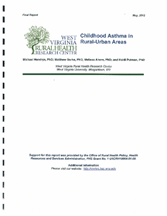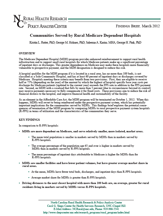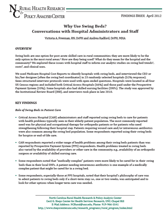
July 2012
Program in Focus
The purpose of the National Maternal and Child Oral Health Resource Center (OHRC) is to respond to the needs of states and communities in addressing current and emerging public oral health issues. The HRSA funded project supports health professionals, program administrators, educators, policymakers, and others with the goal of improving oral health services for infants, children, adolescents, and their families. The resource center collaborates with federal, state, and local agencies; national and state organizations and associations; and foundations to gather, develop, and share quality and valued information and materials.
You can learn more about the OHRC by going to http://www.mchoralhealth.org/ ![]() . You can also view and order publications related to oral health by going to http://ask.hrsa.gov/results_materials.cfm?type=kword&searchterm=649 and clicking on the publication titles.
. You can also view and order publications related to oral health by going to http://ask.hrsa.gov/results_materials.cfm?type=kword&searchterm=649 and clicking on the publication titles.
July Public Health Observances:
- Juvenile Arthritis Awareness Month
- National Cleft & Craniofacial Awareness & Prevention Month
- UV Safety Month
For more information on these and other July National Health Observances, see HealthFinder’s National Health Observances Calendar at http://www.healthfinder.gov/nho/nho.asp?year=2012#m7.
August Public Health Observances:
- National Immunization Awareness Month
- National Breastfeeding Month
- Children's Eye Health and Safety Month
The complete list for August can be found at http://www.healthfinder.gov/nho/nho.asp?year=2012#m8.
New Publications Available at the HRSA Information Center
Childhood Asthma in Rural-Urban Areas. Final Report (May 2012)

This report assesses rates of lifetime and current asthma for children across the rural-urban continuum for the US. It examines how asthma may be related to rural areas adjacent or non-adjacent to larger population centers, to variation in measures of air quality, to varying levels of agriculture and animal production, and to other characteristics such as obesity, race/ethnicity, or health insurance. The report includes tables and references. Use inventory code ORHP00562 to order.
Communities Served by Rural Medicare Dependent Hospitals. Findings Brief (March 2012)

This findings brief explores the potential consequences of terminating the Medicare Dependent Hospital (MDH) program in October 2012. It compares MDHs to rural prospective payment system hospitals in terms of utilization and the characteristics of the communities they serve. The findings brief presents key findings and includes a table and figures. Use inventory code ORHP00560 to order.
Why Use Swing Beds? Conversations With Hospital Administrators and Staff. Findings Brief (April 2012)

This findings brief explores swing bed trends, costs, and clinical uses in rural communities. It used the Medicare Hospital Costs Reports to identify hospitals with swing beds and interviewed pertinent personnel in all four US Census regions in both critical access hospitals and those paid under the prospective payment system. The findings brief presents key findings and includes references. Use inventory code ORHP00561 to order.
To order publications: call 1-888-Ask-HRSA, log onto our Web site http://www.ask.hrsa.gov, or send an email message to ask@hrsa.gov.